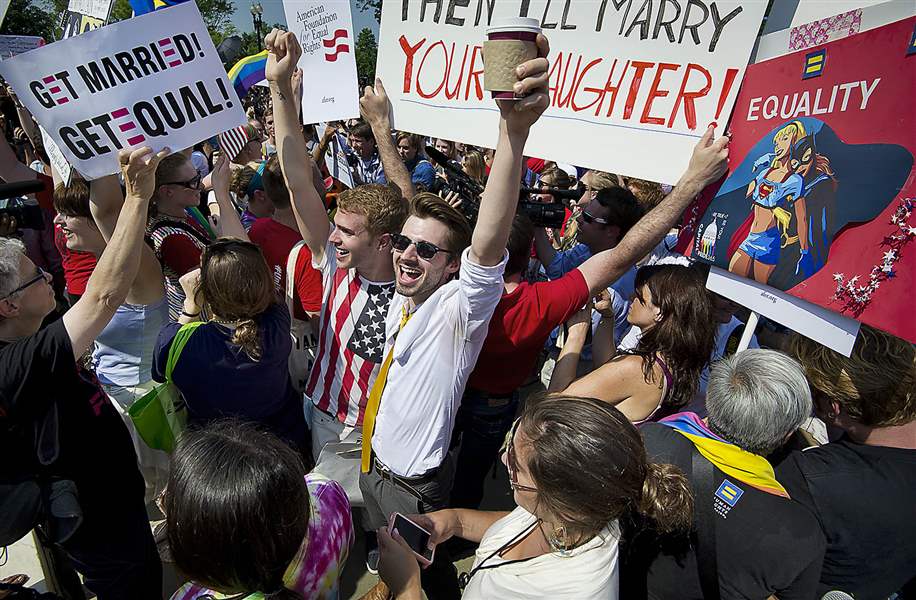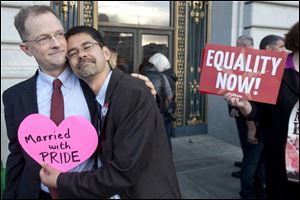
Justices OK gay marriage in 12 states where it is legal
Landmark 5-4 decision adds benefits
6/27/2013
Gay rights activists react outside the U.S. Supreme Court building in Washington on Wednesday after the court struck down a controversial federal law that defines marriage as a union between a man and a woman.
AFP/GETTY IMAGES

Gay rights activists react outside the U.S. Supreme Court building in Washington on Wednesday after the court struck down a controversial federal law that defines marriage as a union between a man and a woman.
WASHINGTON — A divided U.S. Supreme Court on Wednesday handed down a pair of landmark decisions that restore the right to gay marriage in California and require the federal government to extend benefits to same-sex couples who wed in states where it is legal.
The implications are sweeping for gay couples in 12 states and the District of Columbia, but have little effect in Ohio, Michigan, and 36 other states that don’t recognize same-sex marriage.
“Couples in those 38 states have the same legal status that they had yesterday. They can’t get married under state law, and they don’t have the access to federal benefits that hinge on marriage,” said professor Doug NeJaime, of Loyola School of Law in Los Angeles.
Wednesday’s decisions fell short of opening the doors to gay marriage nationwide and left in place a provision in the Defense of Marriage Act, or DOMA, that allows a state not to recognize same-sex marriages from outside its borders.
RELATED ARTICLES:
It was a mixed result but a victory nonetheless for the boisterous crowd of thousands gathered on the high court’s steps.
The pair of 5-4 decisions disappointed others, including religious groups and congressional Republicans who pledged to work to find other ways to protect traditional marriage.
Writing for the majority in United States vs. Windsor, Justice Anthony Kennedy said drafters of DOMA sought “to impose a disadvantage, a separate status, and so a stigma upon all who enter into same-sex marriages made lawful by the unquestioned authority of the states.”
He wrote, “DOMA instructs all federal officials, and indeed all persons with whom same-sex couples interact, including their own children, that their marriage is less worthy than the marriages of others.” The four members of the court’s liberal wing, Justices Ruth Bader Ginsburg, Stephen Breyer, Sonia Sotomayor and Elena Kagan, joined in the majority.
Justice Kennedy wrote that the 1993 federal law’s purpose was to demean, disparage, injure, and stigmatize same-sex couples.
In a lengthy dissent, Justice Antonin Scalia disagreed.
“Favoring man-woman marriage no more ‘demeans’ and ‘humiliates’ other sexual relationships than favoring our Constitution demeans and humiliates the governmental systems of other countries,” he said from the bench on Wednesday.
Justice Scalia also blasted the majority for scarcely mentioning DOMA supporters’ arguments for upholding the law. In oral arguments in March, they said procreation is the principle reason for marriage, and that gay couples cannot have biological children together.
He was joined by the court’s more conservative members, Chief Justice John Roberts and Justices Clarence Thomas and Samuel Alito. They issued three dissents, in all.
The California case was also decided by 5-4, but with a different and very unusual alignment of justices. Chief Justice Roberts wrote the majority opinion declining to rule on the constitutionality of Proposition 8. He was joined by Justices Scalia, Ginsburg, Breyer, and Kagan.
Chief Justice Roberts said the failure of officials in California to appeal the trial court decision against them was the end of the matter. Proponents of Proposition 8 had suffered only a “generalized grievance” when the ballot initiative they had sponsored was struck down, the chief justice wrote, and they were not entitled to represent the state’s interests on appeal. The ruling in the case, Hollingsworth vs. Perry, erased the appeals court’s decision striking down Proposition 8.

John Lewis, left, and Stuart Gaffney embrace outside San Francisco's City Hall shortly before the U.S. Supreme Court ruling Wednesday clearing the way for same-sex marriage in California.
As a formal matter, the decision sent the case back to the appeals court, the U.S. Court of Appeals for the 9th Circuit, in San Francisco, “with instructions to dismiss the appeal for lack of jurisdiction.” That means the trial court’s decision stands.
Meanwhile, the Pentagon already is preparing to implement the provisions of the DOMA decision.
“The Department of Defense intends to make the same benefits available to all military spouses — regardless of sexual orientation — as soon as possible. That is now the law of the land, and it is the right thing to do,” Defense Secretary Chuck Hagel said Wednesday.
Opponents of same-sex marriage were scarce Wednesday outside the court. One man stood across the street with a colorful sign about sodomy and another unfurled a banner reading “Marriage = 1 man + 1 woman.”
In phone calls from Air Force One, President Obama congratulated plaintiffs in the cases and remarked that the decisions came down exactly 10 years after Lawrence vs. Texas, when the court struck down laws making same-sex relationships illegal.
Gay marriage currently is legal in 12 states and the District of Columbia. Now that DOMA has been struck down, people married in those states will have the same federal rights and responsibilities as opposite-sex married couples.
Under DOMA, same-sex spouses could not be buried together in veterans’ cemeteries, they had to follow complicated procedures to file taxes jointly, and they were taxed on health benefits some employers provided through domestic partner benefits.
Wednesday’s ruling means they’ll get those benefits and others now, but will also have new responsibilities. For example, same-sex spouses’ income will now have to be included in calculations of federal financial aid, and assets of same-sex spouses will need to be reported on financial disclosure forms required of high-ranking federal officials.
The Block News Alliance consists of The Blade and the Pittsburgh Post-Gazette. Tracie Mauriello and Ann Rodgers are reporters for the Post-Gazette.
Contact Tracie Mauriello at:
tmauriello@post-gazette.com
or 703-996-9292.